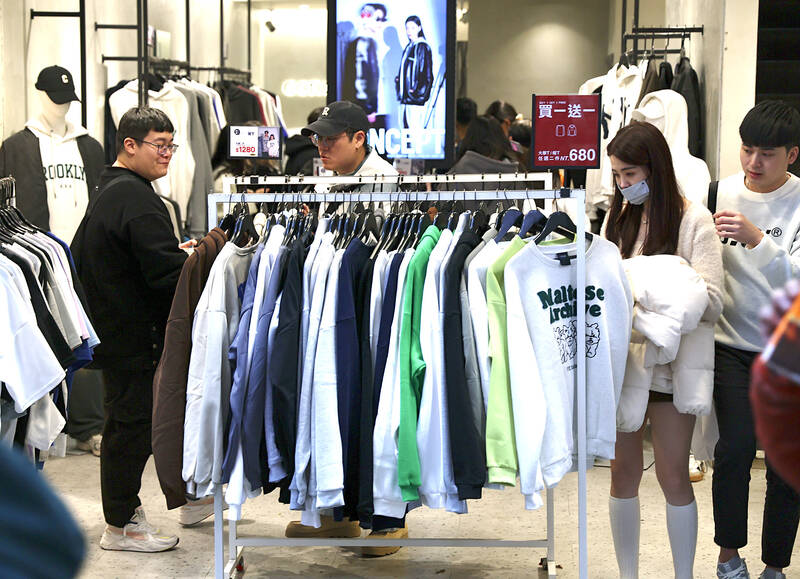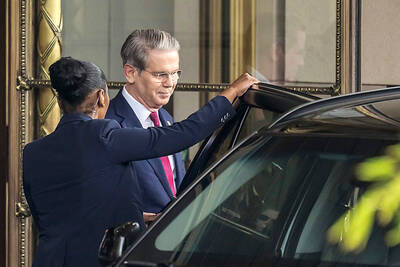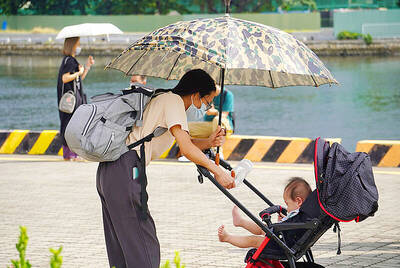Taiwan’s GDP expanded at a faster-than-expected pace last quarter, bringing full-year economic growth to 4.3 percent — the most robust performance in three years, the Directorate-General of Budget, Accounting and Statistics (DGBAS) said yesterday.
The economy grew 1.84 percent in the fourth quarter, beating the 1.72 percent forecast by the DGBAS in November. That lifted last year’s GDP growth by 0.03 percentage points past the agency’s forecast of 4.27 percent.
For this year, it forecast that GDP would grow 3.29 percent.

Photo: CNA
The primary factors that propelled last quarter’s GDP growth were stronger fixed asset investment and improvement in inventory adjustments, the DGBAS said in a statement.
Local manufacturers imported 41.23 percent more manufacturing equipment last quarter compared with the same period last year, the statistics showed.
Exports jumped at an annual rate of 8.19 percent last quarter, driven by robust demand for emerging technologies such as artificial intelligence (AI)-related products and new information and communications technology items, but the growth fell short of the agency’s estimate of 10.28 percent.
Imports swelled 18.3 percent year-on-year, which also lagged behind an estimate of 18.52 percent growth. The DGBAS attributed the growth to increased investments in manufacturing equipment and raw material buildup.
Taiwan Semiconductor Manufacturing Co (台積電), the world’s biggest contract chipmaker, last year invested a record-high US$29.76 billion in capital expenditure and plans to spend up to US$42 billion this year, which could further drive up imports.
Net exports, the value of the country’s total exports minus the value of its total imports, negatively impacted Taiwan’s GDP by 3.5 percentage points last quarter.
Domestic demand rose 6.27 percent last quarter, contributing 5.34 percentage points to the overall economic growth mostly due to strong growth in capital formation, the DGBAS said.
Private consumption, a major constituent of domestic demand, increased 1.94 percent year-on-year last quarter, benefiting from wage hikes, stock market rallies and year-end holiday consumption. The figure outpaced the agency’s forecast of 1.65 percent growth.
Government consumption rose 2.26 percent annually last quarter, lower than the agency’s estimate of 4.29 percent. Capital formation surged 17.53 percent — well ahead of the DGBAS’ forecast of 11.3 percent.
Separately, a majority of the central bank’s board of directors expect the economy to grow steadily this year and see no need to raise interest rates in the near term, according to the minutes of the quarterly board meeting released yesterday.
The central bank expects GDP to expand 3.13 percent this year, without pricing in potential tariff hikes by the US.
The bank left key interest rates unchanged for a third straight time last month, and retained select credit controls after the domestic property market cooled down moderately as a result of seven rounds of credit restrictions.
However, the bank cautioned that the US’ trade policy, tariff hikes particularly, poses great uncertainty after the return of Donald Trump the White House.
That would create challenges for the central bank in determining its monetary policy, it said.
Some of the board directors were also concerned about inflation risks, and one director said the board should closely monitor changes in the consumer price (CPI) index as people have deeply felt the pinch of high rents and increases in food prices and healthcare costs.
The bank forecast that CPI growth would moderate to 1.89 percent from 2.18 percent last year.

Taiwanese Olympic badminton men’s doubles gold medalist Wang Chi-lin (王齊麟) and his new partner, Chiu Hsiang-chieh (邱相榤), clinched the men’s doubles title at the Yonex Taipei Open yesterday, becoming the second Taiwanese team to win a title in the tournament. Ranked 19th in the world, the Taiwanese duo defeated Kang Min-hyuk and Ki Dong-ju of South Korea 21-18, 21-15 in a pulsating 43-minute final to clinch their first doubles title after teaming up last year. Wang, the men’s doubles gold medalist at the 2020 and 2024 Olympics, partnered with Chiu in August last year after the retirement of his teammate Lee Yang

FALSE DOCUMENTS? Actor William Liao said he was ‘voluntarily cooperating’ with police after a suspect was accused of helping to produce false medical certificates Police yesterday questioned at least six entertainers amid allegations of evasion of compulsory military service, with Lee Chuan (李銓), a member of boy band Choc7 (超克7), and actor Daniel Chen (陳大天) among those summoned. The New Taipei City District Prosecutors’ Office in January launched an investigation into a group that was allegedly helping men dodge compulsory military service using falsified medical documents. Actor Darren Wang (王大陸) has been accused of being one of the group’s clients. As the investigation expanded, investigators at New Taipei City’s Yonghe Precinct said that other entertainers commissioned the group to obtain false documents. The main suspect, a man surnamed

US Secretary of the Treasury Scott Bessent and US Trade Representative Jamieson Greer began talks with high-ranking Chinese officials in Switzerland yesterday aiming to de-escalate a dispute that threatens to cut off trade between the world’s two biggest economies and damage the global economy. The US delegation has begun meetings in Geneva with a Chinese delegation led by Chinese Vice Premier He Lifeng (何立峰), Xinhua News Agency said. Diplomats from both sides also confirmed that the talks have begun, but spoke anonymously and the exact location of the talks was not made public. Prospects for a major breakthrough appear dim, but there is

The number of births in Taiwan fell to an all-time monthly low last month, while the population declined for the 16th consecutive month, Ministry of the Interior data released on Friday showed. The number of newborns totaled 8,684, which is 704 births fewer than in March and the lowest monthly figure on record, the ministry said. That is equivalent to roughly one baby born every five minutes and an annual crude birthrate of 4.52 per 1,000 people, the ministry added. Meanwhile, 17,205 deaths were recorded, resulting in a natural population decrease of 8,521, the data showed. More people are also leaving Taiwan, with net